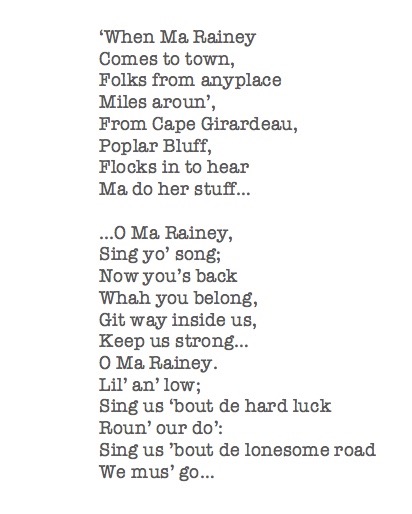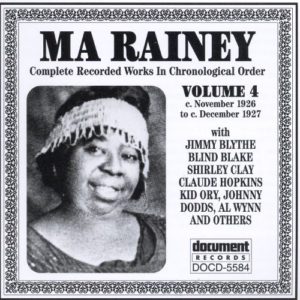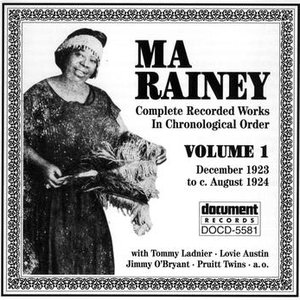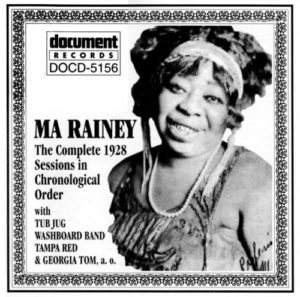MA RAINEY
‘THE MOTHER OF THE BLUES’
Post available in English, Spanish, French, German, Italian and Russian.
[vc_row full_width_row=”true” padding_left=”120″][vc_column width=”1/6″][vc_btn title=” Deutsch” color=”peacoc” link=”url:https%3A%2F%2Fwww.adamoandvicci.com%2F2018%2F03%2Fma-rainey-die-mutter-des-blues%2F||target:%20_blank|”][/vc_column][vc_column width=”1/6″][vc_btn title=”русский” color=”peacoc” link=”url:https%3A%2F%2Fwww.adamoandvicci.com%2F2018%2F03%2F%25d0%25bc%25d0%25b0-%25d1%2580%25d0%25b5%25d0%25b9%25d0%25bd%25d0%25b8-%25d0%25bc%25d0%25b0%25d1%2582%25d0%25b5%25d1%2580%25d1%258c-%25d0%25b1%25d0%25bb%25d1%258e%25d0%25b7%25d0%25b0%2F||target:%20_blank|”][/vc_column][vc_column width=”1/6″][vc_btn title=” Français” color=”peacoc” link=”url:https%3A%2F%2Fwww.adamoandvicci.com%2F2018%2F03%2Fma-rainey-la-mere-du-blues%2F||target:%20_blank|”][/vc_column][vc_column width=”1/6″][vc_btn title=”Español” color=”peacoc” link=”url:https%3A%2F%2Fwww.adamoandvicci.com%2F2018%2F03%2Fma-rainey-la-madre-del-blues-2%2F||target:%20_blank|”][/vc_column][vc_column width=”1/6″][vc_btn title=”Italiano” color=”peacoc” link=”url:https%3A%2F%2Fwww.adamoandvicci.com%2F2018%2F03%2Fma-rainey-la-madre-del-blues%2F||target:%20_blank|”][/vc_column][/vc_row][vc_row][vc_column][vc_empty_space][/vc_column][/vc_row][vc_row][vc_column][vc_separator][/vc_column][/vc_row][vc_row][vc_column][vc_empty_space][/vc_column][/vc_row][vc_row][vc_column][vc_column_text]
Let me start by saying that I am not fully satisfied with this blog post. Ma Rainey is one seriously interesting lady… honestly, I could write a thesis on her, not a blog post! So sadly I’ve had to leave out a lot of interesting information. I’m sorry! But if what you read here interests you then I recommend reading the books listed in the sources. Each one has given me a deeper understanding not only of the lives and work of the artists they talk about, but of the greater cultural and societal importance of women’s blues in the 1920s.
Included in this post:
- Who was Ma Rainey?
- Who were the Rabbit Foot Minstrels?
- Ma’s Sound
- Ma’s Contribution to the Blues
- Female Independence and Sexual Disconformity
- Ma Rainey Playlists – old and new
WHO WAS MA RAINEY?
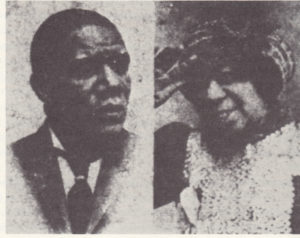
Ma and Pa Rainey [1]
Life: 26 April 1886 – 1939. Born in Columbus, Georgia.
Gertrude “Ma” Rainey, started performing at an early age (around 10 or 12 years old) in talent shows. It is said that she was first exposed to the blues in 1902, when she was performing in a small town in Missouri. She heard a girl singing, and was so captivated by the strange and poignant song that she learnt the song and used it soon after as an encore in her show. The audiences loved it, and so it remained as part of her act.
Gertrude married Will Rainey, a comedy singer, on 2 February 1904 and until 1916 they toured as a partnered song and dance act, billed as ‘Ma’ and ‘Pa’ Rainey, Assassinators of the Blues’. Ma and Pa travelled with the Rabbit Foot Minstrels for many years (a travelling minstrel show which launched many of the famous female blues singers careers). It was during her time travelling with minstrel shows that Ma Rainey is said to have met and coached the young Bessie Smith.
WHO WERE THE RABBIT FOOT MINSTRELS?
“This life – full of travel, performance, and collaborative creativity – was only a dream for most African-Americans in the early twentieth century, male or female. Rainey’s position as the undisputed star of the Rabbit Foot Minstrels made her an icon among her people. She seemed to embody freedom, and in the embodiment established an archetype for the women in music who followed her: the “stubborn woman”; the “bad woman”; the “wild woman” of the blues.”
From ‘A Bad Woman Feeling Good: Blues and the Women Who Sing Them’ by Buzzy Jackson [2]
MA’S SOUND
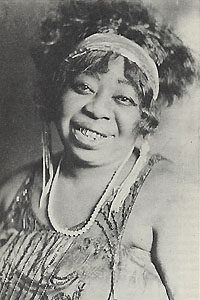 Her voice is described as “earthy, powerful, and deep contralto” with an “authentic manner of singing the blues” [3]
Her voice is described as “earthy, powerful, and deep contralto” with an “authentic manner of singing the blues” [3]
In the book ‘Black Pearls: Blues Queens of the 1920s’ her singing is described as having “retained those characteristics most admired by Africans and Afro-Americans – buzzing sound, huskiness, satirical inflections, ability to translate everyday experiences into living sound. Her dynamism fueled with empathy drew her listeners into the mood of a blues.” [4]
She had a more country sound then some female artists of the era, bridging the gap between traditional, rural, country blues and the vaudeville style blues. She sang of the horror of floods and crop failure as well as travel, mistreatment, sex, prostitution, revenge and alienation. She could also be really funny and turn everyday topics into humorous music.
“Her pearls, silk dresses,and famous necklace of gold coins showed her audience that she had graduated to another level – but she was taking her down home sound with her. For all her finery, Rainey was always recognisable as an earthy, country woman, and her fans loved her for it.” [5]
MA’S CONTRIBUTION TO THE BLUES
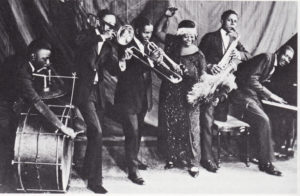
Ma Rainey’s Wildcats Jazz Band [1]
Koko Taylor, who listened to Rainey while growing up, said “What these women did – like Ma Rainey – they was the foundation of the blues. They brought the blues up from slavery up to today”. [6]
After performing for over 20 years (never outside of the South), Ma was picked up by Paramount Records in 1923 and immediately billed as the ‘Mother of the Blues’. Her recordings with Paramount were hugely successful as she already had her own following of fans from live shows. Theatre businesses were worried that the rise in popularity of records would diminish the demand for live theatre, however, for Ma Rainey at least, this was not a worry. Thanks to her enthralling stage presence her recordings were never competition for her stage career and both continued to soar.
In 1924 Ma joined the TOBA circuit (the ‘Theatre Organisers Booking Association’, referred to by Ma Rainey as ‘Tough On Black Asses’). The TOBA had a network of theatres (predominantly white owned) and worked by scheduling acts for the theatres that belonged to its network. For nearly 30 years the TOBA provided regular bookings for many black entertainment artists. The TOBA circuit helped Ma to gain more prestige with polished shows in bigger theatres, performing in major cities all around the country. (There will be more information about TOBA in a future post dedicated entirely to that topic).
However what made Ma really popular was “…her compassion, her tenderness, and her willingness to share her money, time or experience with others” “Her audiences reacted to her with affection because she maintained a bond with them; she understood their lives and had the ability to interpret them through the blues she sang”. [7]
Excerpt from the Poem ‘Ma Rainey’ by Sterling Brown (1932) [8]
Ma Rainey was known as being professional and always willing to help others. She was also known for being a good business women. She continued to pack theatres and get top class reviews even when the vaudeville industry was waning in 1928 and 1929. When blues recordings and TOBA were suffering from the depression, Ma moved back to simple tent shows – where she began – and continued to thrive.
During her 5 years working for Paramount she recorded 92 records. She recorded with some of the finest musicians of the time – Lovie Austin, Fletcher Henderson, Tom Dorsey and Louis Armstrong. Sadly the quality of her paramount recordings are so poor we very rarely get to hear her today. (Sadly I would never DJ any of her original works due to the poor sound quality, however I do DJ a few of her songs that have been covered by more recent artists. You can find a playlist at the bottom of the page.)
FEMALE INDEPENDENCE & SEXUAL DISCONFORMITY
Ma Rainey was one of many blues women who, through her music and her behaviour, challenged the stereotypical view of women and the heterosexual notions of female sexuality. Despite her married status, Ma did not hide her bisexual desires. In fact it seemed to be part of her persona. She wrote and performed many songs on the subject…
In 1925 Ma was arrested for participating in an orgy with multiple women. Later she wrote and recorded ‘Prove It On Me’.
PROVE IT ON ME (1928)
Went out last night,
had a great big fight
everything seemed to go on wrong
I looked up, to my surprise
The gal I was with was gone
Where she went, I don’t know
I mean to follow everywhere she goes;
Folks say I’m crooked, I didn’t know where she took it
I want the whole world to know
They say I do it, ain’t nobody caught me
Sure got to prove it on me;
Went out last night with a crowd of my friends
They must’ve been women, ’cause I don’t like no men
It’s true I wear a collar and a tie
Makes the wind blow all the while
Don’t you say I do it, ain’t nobody caught meYou sure got to prove it on me [9]
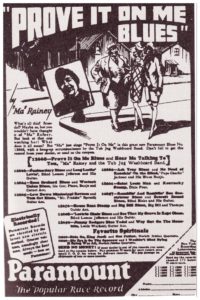 Interestingly there is no record of Ma singing about the stereotypical romantic love or marital relationship, so common in popular music of the day. “In 252 songs recorded by Bessie Smith and Ma Rainey, there are only four – all by Bessie Smith – that refer to marriage within a relatively neutral context…” [10]. “In songs she [Ma] recorded, the institution of monogamous marriage often was cavalierly repudiated with the kind of attitude that is usually gendered as male…” [11]
Interestingly there is no record of Ma singing about the stereotypical romantic love or marital relationship, so common in popular music of the day. “In 252 songs recorded by Bessie Smith and Ma Rainey, there are only four – all by Bessie Smith – that refer to marriage within a relatively neutral context…” [10]. “In songs she [Ma] recorded, the institution of monogamous marriage often was cavalierly repudiated with the kind of attitude that is usually gendered as male…” [11]
In “Blues Legacies and Black Feminism” by Angela Y. Davis, Davis explains how Ma Rainey’s work exemplifies African-American feminist traditions. I highly recommend reading this book to indulge fully on this topic, however for now I have included a couple of Rainey’s song lyrics to give a glimpse into the content of Rainey’s songs.
Barrel House Blues
In ‘Barrel House Blues’ Rainey “celebrates women’s desires for alcohol and good times and their prerogative as the equals of men to engage in acts of infidelity”… In doing so she “launches a brazen challenge to dominant notions of women’s subordination”. [12]
Papa likes his sherry, mama likes her port
Papa like to shimmy, mama likes to sport
Papa like his bourbon, mama likes her gin
Papa likes his outside women, mama likes her outside men. [12]
Black Eye Blues
Domestic abuse, at this time, was considered a private matter, hidden behind domestic walls. Ma Rainey and other women blues singers brought domestic abuse and male violence into the public sphere by singing about it. Their songs did not offer a solution, but perhaps they did offer solidarity and support to female listeners experiencing similar things (this is pure speculation). ‘Black Eye Blues’ describes a woman, Miss Nancy, who “assumes a posture of defiance towards her abusive partner” [13]
I went down the alley, other night
Nancy and her man had just had a fight
He beat Miss Nancy ‘cross the head
When she rose to her feet, she said
You low down alligator, just watch me
Sooner or later gonna catch you with your britches down
You ‘buse me and you cheat me, you dog around and beat me
Still I’m gonna hang around [13]
And to draw this post to close I thought this quote from ‘Black Pearls: Blues Queens of the 1920s’ sums Ma up beautifully…
“The good-humoured, rollicking Rainey loved life, loved love, and most of all, loved her people. Her voice bursts forth with a hearty declaration of courage and determination – a reaffirmation of black life.” [14]
MA RAINEY PLAYLISTS
Original recordings by Ma Rainey
More recent recordings of Ma Rainey’s songs by different artists
SOURCES
- Blues Legacies and Black Feminism by Angela Y. Davis
- Black Pearls: Blues Queens of the 1920s by Daphne Duval Harrison
- A Bad Woman Feeling Good: Blues and the Women Who Sing Them by Buzzy Jackson
- www.biography.com/people/ma-rainey-9542413
- http://jasobrecht.com/ma-rainey-the-mother-of-the-blues/
FOOTNOTES
[1] Photos from http://jasobrecht.com/ma-rainey-the-mother-of-the-blues
[2] Buzzy Jackson. A Bad Woman Feeling Good: Blues and the Women Who Sing Them. p16
[3] Daphne Duval Harrison. Black Pearls: Blues Queens of the 1920s. p35
[4] Daphne Duval Harrison. Black Pearls: Blues Queens of the 1920s. P39
[5] Buzzy Jackson. A Bad Woman Feeling Good: Blues and the Women Who Sing Them. p20
[6] Angela Y. Davis. Blues Legacies and Black Feminism. p138
[7] Daphne Duval Harrison. Black Pearls: Blues Queens of the 1920s. p36
[8] Angela Y. Davis. Blues Legacies and Black Feminism. p139
[9] https://genius.com/Ma-rainey-prove-it-on-me-blues-lyrics
[10] Angela Y. Davis. Blues Legacies and Black Feminism. p13
[11] Angela Y. Davis. Blues Legacies and Black Feminism. p15
[12] Angela Y. Davis. Blues Legacies and Black Feminism. p22
[13] Angela Y. Davis. Blues Legacies and Black Feminism. p22
[14] Daphne Duval Harrison. Black Pearls: Blues Queens of the 1920s. p40[/vc_column_text][/vc_column][/vc_row]
